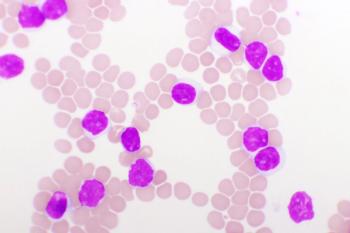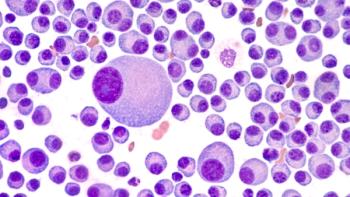
Data in The Lancet Oncology confirmed the standard of care as the optimal dosage to treat patients with indolent non-Hodgkin lymphoma.

Your AI-Trained Oncology Knowledge Connection!


Data in The Lancet Oncology confirmed the standard of care as the optimal dosage to treat patients with indolent non-Hodgkin lymphoma.

Data from Radiology found early positive results regarding the treatment of intermediate-risk prostate cancer with MRI-guided focused ultrasound ablation.

Take a look back at some of the important news and notes from last week in the world of oncology, featuring news about prostate cancer, breast cancer, lung cancer, and more.

Adam Brufsky, MD, PhD, presented data investigating immunotherapeutic options in the neoadjuvant setting for patients with triple-negative breast cancer.

Sara A. Hurvitz, MD, FACP, of the University of California, Los Angeles, discussed a number of emerging novel therapies with the potential to treat patients with HER2-positive metastatic breast cancer in the third-line setting.

Data focusing on patients seeking breast surgical procedures determined that broad skill sets are valuable for general surgeons practicing in rural areas, as breast surgeries only represented a small proportion of total surgical procedures conducted.

The analysis of the KEYNOTE-119 study presented at the Miami Breast Cancer Conference, hosted by Physicians’ Education Resource®, LLC®, found trends estimating a significant role for tumor cell expression in PD-L1 as a predictive biomarker for pembrolizumab efficacy.

The GREEN trial analyzed treatment with obinutuzumab monotherapy or obinutuzumab plus chemotherapy for patients with previously untreated or relapsed/refractory chronic lymphocytic leukemia.

The combination of liposomal doxorubicin, docetaxel, and trastuzumab with metformin produced positive activity and an acceptable safety profile as neoadjuvant treatment for HER2-positive breast cancer.

Amgen announced data from a phase 3 study that found blinatumomab showed prolonged event-free survival compared to consolidation chemotherapy in patients with relapsed acute lymphoblastic leukemia.

Schilsky joined CancerNetwork®’s podcast to discuss ASCO’s Advance of the Year, the top priorities moving forward, and the COVID-19 pandemic.

Data published in The Lancet found that the PD-L1 inhibitor cemiplimab improved overall and progression-free survival for patients with advanced non–small cell lung cancer with PD-L1 of at least 50%.

Data from the Journal of the American College of Surgeons suggest patients 70 years or older with esophageal or esophagogastric junction cancers should be evaluated for optimal curative therapy.

A study published in JAMA Oncology found that, of 6 tested systemic treatment options, abiraterone acetate and apalutamide were the likeliest to improve overall survival when combined with ADT for patients with metastatic castration-sensitive prostate cancer.

Data published in The Lancet Oncology investigating patients with malignant pleural mesothelioma determined that surgery for mesothelioma after radiotherapy, or SMART, can produce positive early- and long-term effects.

Data published in The Lancet Oncology found that a hypofractionated radiation schedule of 55 Gy in 20 fractions is noninferior to a schedule of 64 Gy in 32 fractions for patients with this disease.

Data examining 4 low-value breast cancer procedures found an association between facility-level characteristics and the use of these procedures, suggesting a need for de-implementation targeting efforts in various facilities.

The PHERGain II trial will investigate the treatment of patients with early HER2-positive breast cancer using a chemotherapy-free treatment approach of trastuzumab plus pertuzumab.

A study published in The Lancet Hematology found an increased risk of developing myelodysplastic syndrome and acute myeloid leukemia when patients with cancer were treated with PARP inhibitors compared with placebo.

Richard Schilsky, MD, touched on the research driving ASCO to award “Advance of the Year” to molecular profiling in gastrointestinal cancers, and what the organization’s top priorities are in the near future.

Celsion Corporation announced that fast track designation was granted to their immunotherapy, GEN-1, to treat patients with advanced stage III or IV ovarian cancer.

Follow-up data published in the European Association of Urology did not find a significant improvement in overall survival for patients with locally advanced renal cell carcinoma undergoing adjuvant pazopanib treatment.

Data published in Patient Preference and Adherence found communication improved between patients with CLL and their oncologists when the risk of adverse events and patient goals were top of mind.

A retrospective, population-based cohort study in JAMA Oncology found Black women in the United States were more likely to have a high-risk recurrence score and die of axillary node-negative breast cancer than non-Hispanic White women who had similar scores.

A CASI press release detailed data from a phase 1/2a study examining BI-1206 in combination with rituximab to treat patients with non-Hodgkin lymphoma.

Amgen announced that their new drug application for sotorasib was granted priority review by the FDA to treat patients with KRAS G12C–mutated locally advanced or metastatic non–small cell lung cancer.

CancerNetwork®’s podcast dissected a review article published in the journal ONCOLOGY® on the 21-gene recurrence score in patients with node-positive breast cancer.

A recent trial investigating the potential for stereotactic ablative body radiotherapy to treat patients with extracranial oligometastatic cancer found improved survival and a manageable safety profile.

Data published in Cancer Discovery determined Black patients with acute myeloid leukemia have considerably worse overall survival rates than White patients with the same disease.

CancerNetwork® spoke with the CEO of Nanobiotix and an assistant professor of Oncology at John Hopkins Medicine to learn more regarding the potential of the radio enhancer NBTXR3.